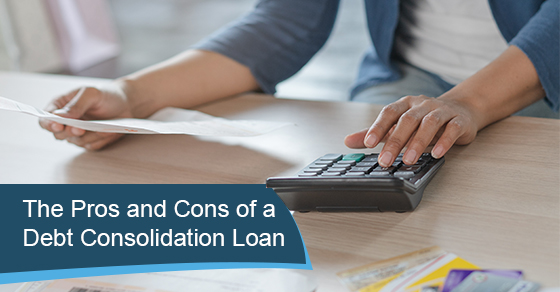
The Pros and Cons of a Debt Consolidation Loan
According to recent statistics, Canadians carry a significant amount of debt. Some people may find that they are overwhelmed with their monthly payments to creditors. Whether your debt has increased because of business decisions, or from a personal need, there are a few solutions for those who are struggling to pay off their debt, including bankruptcy, a consumer proposal, or a debt consolidation loan.
There are pros and cons to each option, and you will need to weigh them all before you make a final decision. How you deal with your debt today can impact areas, such as your credit rating, for a long time into the future.
How does a debt consolidation loan work?
Essentially, with a debt consolidation loan, you can combine several types of debt into one single payment. You can use it to help you with several different creditors, including:
- Credit cards
- Lines of credit
- Public utilities
- Business suppliers
With the help of a trusted advisor, you apply for a loan that will allow you to pay off all your debt at once. Then, you will make monthly installments on the debt loan until it is paid off.
It’s important for you to get a low-interest rate and an affordable monthly payment amount. This is why you should seek the assistance of an advisor, like Charles Advisory Services so that they can do the negotiating for you. By allowing a third party to do the heavy lifting, you can be sure that you will get the best debt consolidation loan that fits your circumstances and needs.
The Pros of Debt Consolidation
There are many reasons that consumers opt for a debt consolidation loan. Some of them are very straightforward, while others stem from a more personal decision. A few of the benefits that come with a debt consolidation loan include:
- Single monthly payment. If you have several different loans, paying them down can get confusing and challenging. Many Canadians have student loan debt, car loans, mortgages, credit cards, and sometimes personal lines of credit that they are paying off. Keep track of who to pay, how much, and when, can feel like a full-time job. Reducing this stress is one of the reasons consumers opt for a debt consolidation loan. By consolidating your debt into one central loan, you will only need to remember to pay it once during the month. It can help those who are trying to stick to a budget and reduce their debt load.
- Low-interest rate. When you borrow money, it can sometimes come at a high cost. That cost is usually the interest rate, as many credit cards have very high-interest rates. Ultimately, you may be paying double for the privilege of using credit. However, by taking out a debt consolidation loan, you can reduce your interest rate and save money in the long run. Consumers know that cutting down on the money they are paying in high-interest fees can help them get out of debt faster.
- Pay down your debt. With a debt consolidation loan, you will still be paying down the money you owe, but the process will be simpler and more streamlined. Your single monthly payment will be dispersed among all your creditors, which helps you easily pay down your debt.
- Less risk. Having all your payments rolled into one can help you reduce the risk of missed payment fees and penalties. If you have to keep track of several different creditors who all need to be paid on different days throughout the month, it’s easy to lose track and forget one. That one missed payment can not only come with a fee, but it can also damage your credit rating. However, a debt consolidation loan does not hurt your credit rating - it may actually help it. As you start to get a reputation for paying your loans on time and reducing your debt, your credit rating will improve.
- Avoid bankruptcy. One of the key benefits of going the debt consolidation route is to avoid dire financial situations, such as bankruptcy. If you are having a difficult time keeping up with your payments and you fear falling behind, a debt consolidation loan can help you.
The Cons of Debt Consolidation
While there are many good reasons to consider a debt consolidation loan, there are a few drawbacks that you need to be aware of, including:
- Securing the loan. As part of the debt consolidation loan approval process, you may be asked for collateral to secure the loan. This could be an additional mortgage for your home or a lien on your vehicle. This gives the lender some reassurance that if you are unable to pay the loan, they won’t lose all their money. However, it does mean that if your loan goes into default because you are not able to keep up with your payments, you run the risk of losing your home or vehicle.
- Paying the loan. Consolidating your loan payments into one is not likely to reduce the monthly sum that you have to pay. Therefore, if you are struggling to pay all of your creditors each month, you may still have trouble paying your debt consolidation loan. This is something that borrowers should consider carefully, particularly if you are asked to provide collateral to secure the loan.
- Bad habits. Getting a debt consolidation loan won’t cure you of bad spending habits that result in high debt levels. It’s important to use your credit cards with caution. If you continue to rack up debt even after you have consolidated your payments, you can end up with an even higher level of debt than when you began.
If you are interested in learning more about debt consolidation, call Charles Advisory Services at 416-915-9007 or contact us here.

Leave A Comment